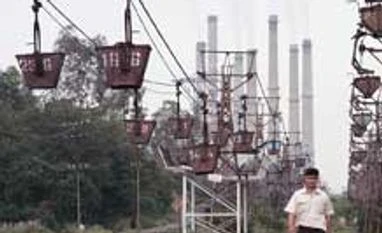According to India’s largest power generator, NTPC (formerly National Thermal Power Corporation), the volume of power purchased across the country will dip further. “Almost all states at some part of the day ask us to back down our supply,” it said in response to a questionnaire.
Early monsoon, pleasant weather and increased generation by hydro power utilities are some of the reasons why it could be seasonally low.
In FY13, NTPC, which has an installed capacity of 41,184 MW, lost 20.4 billion units (BUs) due to either low schedule or backing down and 13 BUs due to fuel shortage. This year till May 2013, the company lost 3.9 BUs due to low schedule / backing down and 4.5 BUs due to fuel shortage. “Thus, it is ironical that on the one hand we are facing peak and energy shortage, on the other, the capacity is getting stranded for want of fuel / schedule,” said an NTPC executive.
The main reason behind lower power purchase is the tight financial condition of state distribution utilities. “In any other country, power off-take is a function of demand. Here, it is a function of bankrupt discoms,” said Ashok Khurana, director-general of the Association of Power Producers (APP). According to rating agency India Ratings, this trend would translate into higher offtake risk for power generators, which use costlier imported coal. Plus, the government recently accepted recommendations that would double the cost of natural gas produced in the country.
“A higher incidence of back-down instruction by off-takers can also lead to lower operating efficiency in the form of higher station heat rate, auxiliary consumption and secondary oil usage resulting in losses on fuel costs for plants operating under cost plus regime,” said India Ratings in its report. Newer capacity of power, which has recently been added and in the process of coming is also at huge risk. According to an estimate by consulting firm Deloitte Touche Tohmatsu, as much as 22,000 megawatts of power capacity in India is waiting for buyers to sign long-term contracts with them.
“Discoms are neither buying long-term nor short-term power to fulfil their entire requirement. Around 22,000 MW capacity, which is going to come up in the near future is waiting to be tied up,” said Debashish Mishra, senior director at Deloitte Touche Tohmatsu. Case 1 bids are called for by states where they purchase power from generators without any liability of providing them with either land or fuel. Electricity traders, who have been banking on an election surge in power demand, are also waiting and watching. If there is an election effect on power prices, it is yet to be seen, say traders. The last election saw a huge surge in power demand, taking up power costs above Rs 7 a unit. The factor that contributes to the lack of interest in more power is general reduction in peak power demand. “The peak deficit for power is at around 7-8 per cent now. It has always been at around 13-14 per cent. The theory that India will continue to have energy deficit for ever is being tested now,” says Mishra.
Some states are also inching towards becoming power-surplus, almost closing avenues for long-term contracts to be signed which last as long as 25 years. Gujarat, Maharashtra and Chhattisgarh are on the threshold of being power-surplus. Madhya Pradesh is expected to be power-surplus by the next year. Punjab and Haryana have already tied up their requirements for the next three years, leaving the three southern states of Tamil Nadu, Karnataka and Andhra Pradesh in power deficit.
While states do not need more power, consumers are still battling power outages. Discoms are forced to go for power cuts, making high electricity consuming areas such as Gurgaon go for expensive diesel generating sets.
The unit cost of power produced by a diesel genset is at Rs 17. “There is around 6-7 hours power cuts in Gurgaon, Faridabad and Ghaziabad,” says Khurana, who resides in Delhi.
APP has given a suggestion to the central power regulator to increase power sales. If power is available at a rate below Rs 5.50 per unit, discoms should not force cutdowns. However, discoms will buy power only when they can afford to buy.
)